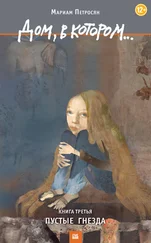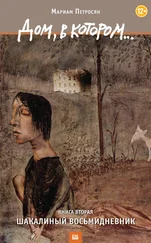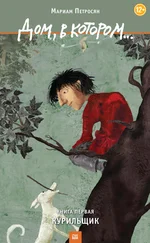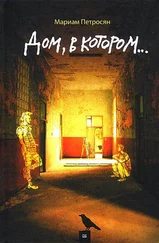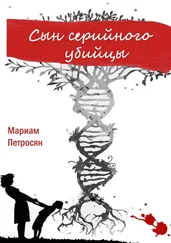“So it would appear. He is not one of the old ones, and that's all there's to it. Take us, for example. We know things, even if we don't exactly know what it is we know. He doesn't.”
“I think the words are getting the better of you.”
“As does everything lately. It's a weird old thing, the world. And you are saying that it was Elephant rambling past just then, like a rhino with a screw loose. What am I supposed to make of it? You know I'm scared of things like that. Harmless little Elephant goes out at night sniffing, for some reason... Now what do I do? I'm upset, you see. I guess I'd better check on him.”
“Of course. Go.”
The door squeaked. Blind traced Vulture's progress, turning his head as if he really could see, then closed his eyes and sank into a cozy slumber. And the Forest returned. It overtook him, breathing into his ears, tucking him into its moss and dried leaves, hiding him and rocking him to sleep with the soft lullabies of the whistlers. It liked Blind. It smiled at him. Blind knew that. He could sense a smile from a distance. The burning ones, the sticky and sharp-toothed ones, the soft and cuddly ones. Their fleeting nature tormented him, that and his inability to subject them to the probing of his fingers and ears. A smile couldn't be caught, grasped, examined in minute detail, it couldn't be replicated. Smiles fled, they could only be guessed at. Once, when he was still little, he heard Elk asking him to smile. He could not understand what was required of him then.
“A smile, my boy, a smile,” Elk said. “The best of the human features. Until you learn to smile you're not quite human yet.”
“Show me,” Blind requested.
Elk bent down to him and let Blind's fingers probe his face. Blind encountered the wet teeth and jerked his hand.
“It's scary,” he said. “Can I please not do that?”
Elk sighed resignedly.
A lot of time had passed since then, and Blind had learned to smile, but he knew that a smile did not make him more appealing, like it did others. He stumbled upon the wide-mouthed faces on the tactile pictures in his books, found them on toys, but none of those were something that made itself visible in the voice. Only listening to the smiling voices did he finally understand. A smile meant a light switching on inside. Not for everyone, but for many it did. He knew now what Alice must have felt when the Cheshire Cat's toothy, sarcastic smile was floating in the air in front of her. That was how the Forest smiled. From above, in a boundless mocking grin.
Blind rose and staggered forward, stumbling against tree roots. His foot dropped into someone's burrow. A whistler startled and went silent. Blind bent forward, felt in the grass and grasped it—a tiny one, covered in peach fuzz and smelling of a young cub. He cradled it against his cheek. The whistler was breathing softly, its heart ticking in his fingers. A worried whistle issued from about ten paces ahead. The baby in his hand squeaked in response. Blind laughed and placed it on the ground. The grass rustled. The baby rushed to its mother, squeaking along the way, and soon their joined whistling faded in the distance. Before continuing on, Blind sniffed at his hand to better remember the baby's scent. An adult whistler smelled different.
He couldn't feel his legs. They became alien and bent in all the wrong directions, as if made of rubber. That irked him. He soon grew tired of snatching them out of holes and avoiding mud and puddles and decided to sit down. His legs folded the wrong way again. It also seemed that there were more than two of them now. He was probably turning into something, but the transformation wasn't complete yet. He heard the laughter of the dogheads. They were still far off, running, giggling, bumping against each other. Blind shot up and tottered away on all six of his legs, long and articulated. The stray leaves clung to them, but they made for an easy gait. He hid in the nearest hole and waited in silence. The dogheads thundered past. The disgusting guffaws faded. Blind peeked out cautiously. Something hooted in the canopy and dropped a cloud of rotted wood on him. He shook himself off and counted the legs again. This time there were two. The night was stifling. Blind pulled off his sweater and threw it away. Then took off the waterlogged sneakers, tied their laces together, and dropped them into the hole.
He touched the gnarly trunks as he went by, his ears pricked. Slender, silent, invisible against the trees, he was a part of the Forest, its offshoot, a changeling. The Forest was walking alongside him, swaying its treetops far above, dropping its dew on the warped floorboards.
Blind stopped at the clearing. The gigantic moon drenched him in silver. He crouched, feeling the light bathing him, feeling his fur stand on end, electrified by this light. He pinned back his ears, closed his eyes, and howled.
A lingering, mournful sound enveloped the Forest. It was full of sorrow, but also of Blind's joy, of the closeness of the moon, of the night's own life. It didn't last long, and then Blind bolted into the thickets to sniff at the mossy trunks and dance on the wet leaves and roll around on the ground. He was boisterous, scaring off the small creatures, covering his fur in debris, leaving wolflike prints in the puddles. He ran after a stupid mouse and chased it into someone else's burrow. He peeked into a tree hollow and got hissed at. He excavated an underground lair and ate its owner, a fat, juicy one, spat out the fur, and moved on. The moon was hidden by the trees now, but he felt it as vividly as he'd feel someone standing behind the door or hiding in the bushes—it was that close, and the trees could not hinder it. He leapt over the brook without getting his paws wet, ran back and forth along the shore, found a puddle and gulped it all in, tadpoles included.
A frog, miraculously spared, cursed him piercingly in its language and scampered off to find another hiding place. He stretched on the wet sand, his sharp-eared head on top of the folded paws, listening to the Forest noises and to the grumbling in his stomach, then leapt up and bounded farther along the path, since he didn't like to spend too much time near the water.
He soon was within earshot of the dogheads' howls again, but decided not to hide this time. Instead he howled back in defiance, but they did not accept his challenge and were soon gone, quarreling among themselves. He followed their trail for a while. He would have caught them had he wanted to, but it was a game, not a real hunt, and he liked running games more than chasing games. He suddenly switched direction, as if he'd thought of something he had to go and see about, and from then on ran purposefully, with his nose to the ground, paws moving fast. His tail, up in the air and full of thorns, broadcast his concentration to the world.
Then the Forest ended. Vanished just as instantly as it had appeared. Blind wasn't upset, and he didn't think of going to search for it again. He stopped. Exactly on the edge dividing the darkness and the light rectangle on the floorboards, the yellow glow cast by the opened door. Behind the door, shaggy shadows darted over the tiles and talked in muffled voices. On Saturdays and Sundays the teachers' bathroom was poker territory. The only player in his pack was Noble.
Blind was motionless, and the flame of the candles played in his wide-open eyes. He stood there for a long time. Then he lit a cigarette and moved on. He crossed the strip of light, not hiding anymore, went past the moonlit clearing of the Crossroads, the open door to the bathroom, the door to the staff room, the canteen. The stairs smelled of cigarette butts; he stepped on one of them, still warm, and slowed down.
Down the stairs. Another long, empty corridor, and at the very end of it—more stairs and the door to the basement. He swayed, and his feet slid on the steps. He steadied himself against the wall. Picked the lock with a piece of wire and entered.
Читать дальше
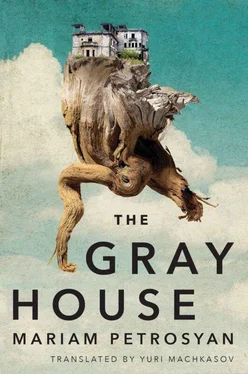
![Мариам Петросян - Дом, в котором… [Издание 2-е, дополненное, иллюстрированное, 2016]](/books/62844/mariam-petrosyan-dom-v-kotorom-izdanie-2-thumb.webp)


